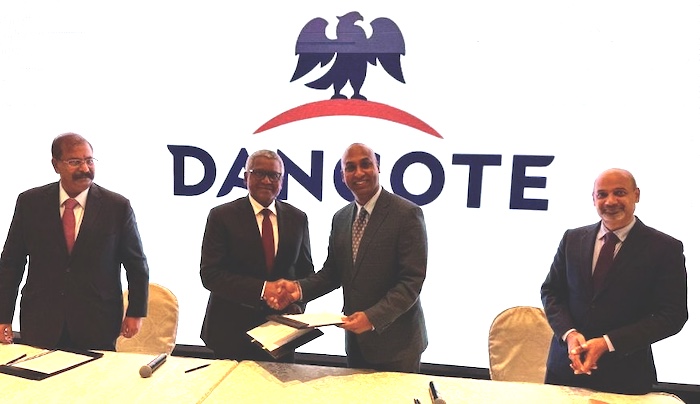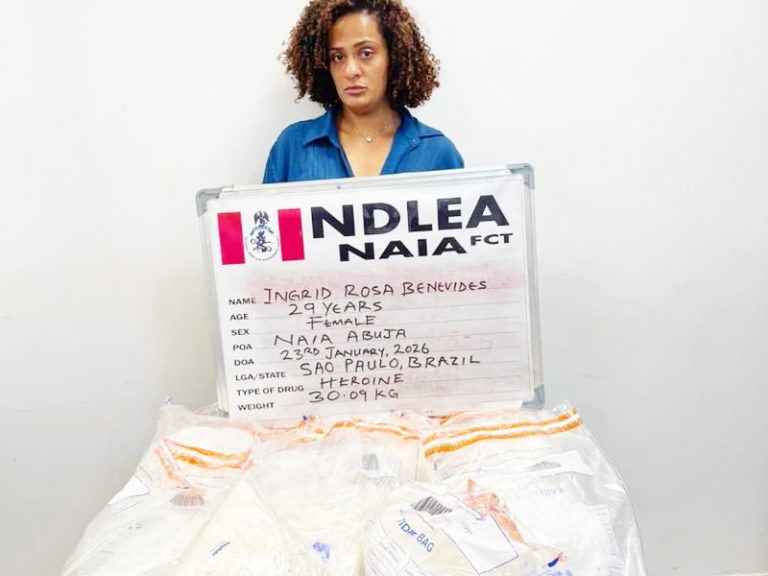
The Dangote Group has announced that it has entered a strategic partnership with Honeywell International Incorporated to support the next phase of expansion of the Dangote 650,000 barrels per day Petroleum Refinery by over 100 per cent.
In a statement issued on Tuesday, Dangote said the collaboration would provide advanced technology and services that would enable the refinery to increase its processing capacity to 1.4 million barrels per day by 2028, marking a major milestone in their long-term vision to build the world’s largest petroleum refining complex.
According to the statement, through this agreement, Honeywell will supply specialised catalysts, equipment, and process technologies that will allow the refinery to process a broader slate of crude grades efficiently and to further enhance product quality and operational reliability.
Honeywell, a US firm, is a global Fortune 100 industrial and technology company, which offers a wide portfolio of solutions across aviation, automotive, industrial automation, and advanced materials.
Honeywell’s division UOP has been a technology partner to Dangote since 2017, providing proprietary refining systems, catalyst regeneration equipment, high performance column trays, and heat exchanger technologies that support our best-in-class operations.
Although the financial terms of the deal were not disclosed, the partnership aligns with a plan unveiled last month by the oil firm to add a new single-train unit, with the goal to meet Nigeria’s domestic demand while producing surplus volumes for export.
The Dangote Group added that it is also advancing its petrochemical footprint. As part of the wider collaboration, the group said it was scaling its polypropylene capacity to 2.4 million metric tons annually using Honeywell’s Oleflex technology.
Polypropylene is a key industrial material widely used across packaging, manufacturing, and automotive applications. In addition to refining expansion, Dangote Group stated that it was progressing with the next phase of its fertiliser growth plan in Nigeria.
“We will increase our urea production capacity from three million metric tons to nine million metric tons annually. The existing plant consists of two trains of 1.5 million metric tons each. The expansion will add four additional trains to meet growing demand for high-quality fertiliser across Africa and global markets.
“Dangote Group remains fully committed to delivering world-class industrial capacity, strengthening Nigeria’s energy security, and driving sustainable economic growth through long-term investment, innovation, and strategic global partnerships”, the statement added.
Meanwhile, analysts at JP Morgan have predicted that oil prices are on course to fall to their lowest level in two decades outside the pandemic, with Nigeria’s benchmark, Brent crude oil, forecast to average $42 during 2027 as a surge in production by the Organisation of Petroleum Exporting Countries (OPEC) cartel triggers a supply glut.
Without any intervention, prices would end up “sliding into the $30s by year-end”, the bank said. Barring the pandemic, when lockdown rules meant travel was heavily restricted, prices were last at $30 in 2004.
The price of Brent has fallen from more than $82 in January to $62 on Tuesday as the Saudi-led OPEC cartel of oil producing nations has boosted output to protect its market share.
Meanwhile, demand has been hit as Chinese consumers ditch petrol and diesel cars for electric vehicles.
Lower oil prices typically help motorists as forecourts should pass on falling wholesale costs to consumers, UK Telegraph reported. JP Morgan forecast that the surplus in oil production would climb to 2.8 million barrels per day next year, up from 1.5 million bpd so far this year.
“Under these conditions, Brent prices are likely to slip below $60 in 2026, drop into the low $50s by the final quarter, and close the year with a $4 handle,” the analysts said.
“The outlook worsens in 2027, as mounting surpluses drive Brent to an average $42, with prices sliding into the $30s by year-end”, JP Morgan added.
Analysts at Deutsche Bank and Macquarie have also forecast drops in oil prices to the mid $50s by the end of this year. Luke Bosdet of the AA said a fall “would be a huge boost to the finances of families with cars and, more importantly, the cost of haulage”.
“That would have a big impact on prices to customers, which should be passed on to consumers,” he said. “The net result should be a significant fall in inflation. But, with global events and economic volatility, I’ll believe it when I see it,” Bosdet said.
In its latest report, the International Energy Agency (IEA) said that global oil supply was up by a “massive” 6.2 million bpd since January. Global oil stockpiles surged by 77.7 million barrels, or 2.6 million bpd, in September, reaching the highest level since July 2021.
However, the Agency warned it was not yet clear how supplies would be impacted by the recent tariff turmoil, the US federal government shutdown and British and American sanctions on Russia’s two largest producers Rosneft and Lukoil.
The Agency said: “Saudi Arabia boosted supply by close to 1.5 million bpd from January through October, in line with its higher quota. By contrast, Russian production is up by only 120,000 bpd over the same period, with growth stymied by sanctions and a challenging operating environment.”
It added that in the final three months of this year, global oil consumption growth “is expected to ease” compared to the previous quarter while crude supply “is on course to rebound further, adding to market balances that look increasingly askew.”
Emmanuel Addeh, Peter Uzoho



